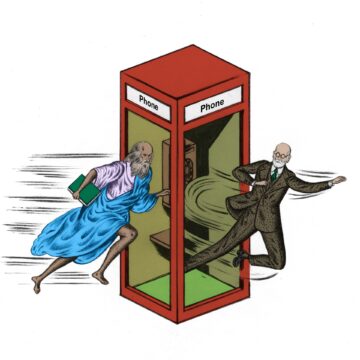Nick Romeo in The New Yorker:
 Around five years ago, David—a pseudonym—realized that he was fighting with his girlfriend all the time. On their first date, he had told her that he hoped to have sex with a thousand women before he died. They’d eventually agreed to have an exclusive relationship, but monogamy remained a source of tension. “I always used to tell her how much it bothered me,” he recalled. “I was an asshole.” An Israeli man now in his mid-thirties, David felt conflicted about other life issues. Did he want kids? How much should he prioritize making money? In his twenties, he’d tried psychotherapy several times; he would see a therapist for a few months, grow frustrated, stop, then repeat the cycle. He developed a theory. The therapists he saw wanted to help him become better adjusted given his current world view—but perhaps his world view was wrong. He wanted to examine how defensible his values were in the first place.
Around five years ago, David—a pseudonym—realized that he was fighting with his girlfriend all the time. On their first date, he had told her that he hoped to have sex with a thousand women before he died. They’d eventually agreed to have an exclusive relationship, but monogamy remained a source of tension. “I always used to tell her how much it bothered me,” he recalled. “I was an asshole.” An Israeli man now in his mid-thirties, David felt conflicted about other life issues. Did he want kids? How much should he prioritize making money? In his twenties, he’d tried psychotherapy several times; he would see a therapist for a few months, grow frustrated, stop, then repeat the cycle. He developed a theory. The therapists he saw wanted to help him become better adjusted given his current world view—but perhaps his world view was wrong. He wanted to examine how defensible his values were in the first place.
One day, a housemate showed him a book called “Philosophy, Humor, and the Human Condition,” by the French Israeli philosopher Lydia Amir. Amir, the housemate explained, was his cousin. In addition to teaching part-time at Tufts University, she offered “philosophical counselling” to private clients. David had never heard of philosophical counselling. But over the next few weeks he read and enjoyed Amir’s book. He watched an episode of an Israeli current-affairs TV show, “London and Kirschenbaum,” in which she debated the merits of philosophical counselling with the hosts. “She actually looked like she enjoyed it when they tried to take her down,” David said. He decided to contact her, and they arranged some online sessions.
More here.
